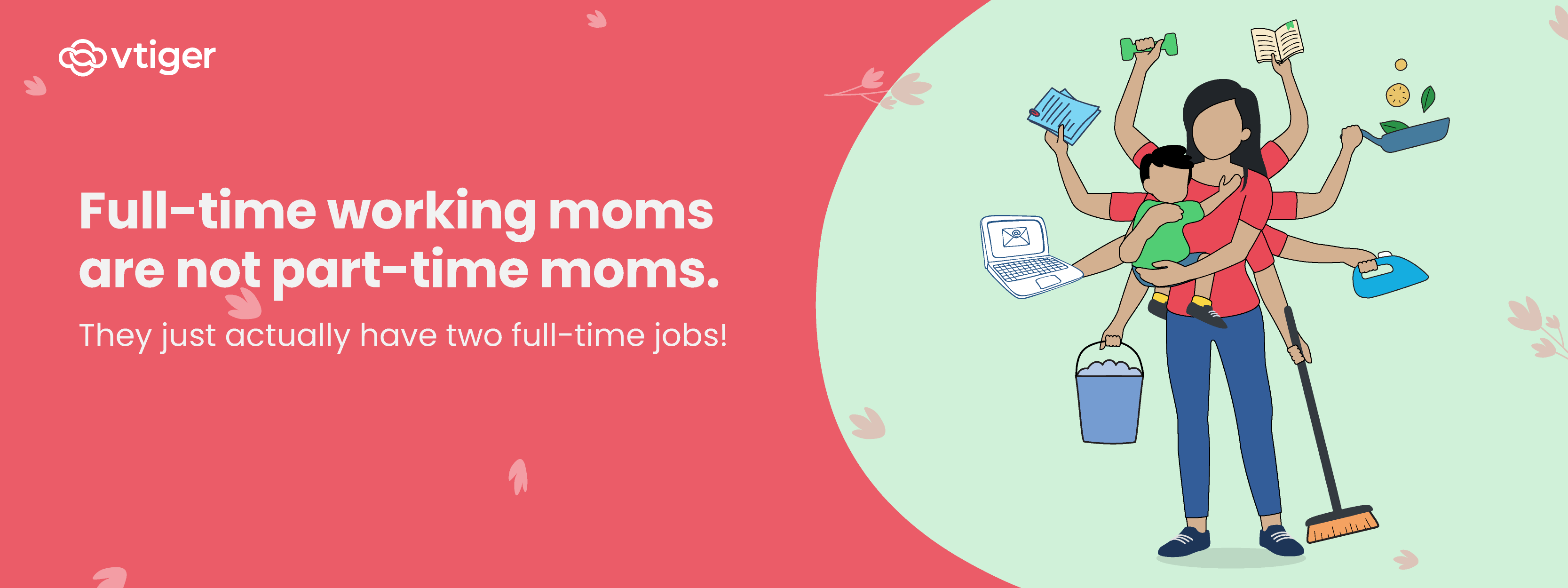The tide is beginning to turn in the world social order. Traditional family roles are changing as democratic notions creep into the social system. Earlier, it was assumed to be written in stone that the man was the provider in the family and the woman the homemaker.
While women have progressed into employment in developed countries, many in developing countries are yet to step out of traditional roles. For example, in India, while a majority of women are still fighting against the old order, some have definitely seen the light at the end of the tunnel. And it is not just because women are beginning to realize that there is a world outside their kitchen windows. Women are also turning out in large numbers in the workforce due to economic necessity.
While people may be willing to accept the idea of career women, they are not willing to excuse them from their duties as career moms. But as in the case of every social change, there is a lag between actions and attitudes. The attitude towards working women seems to be that while people have no objection to availing of their talents and abilities outside the home, women are not allowed to compromise on home life.
What or Who is a Working Mother?
In the first place, the term ‘working mother’ is a misnomer as mothers are working round the clock even if they don’t ‘go to an office’. Being a working mother is not the easiest job in the world. Some women are good at it, some don’t have a choice, some choose a middle path and some don’t even try it. The point is that it is the women who should have the right to exercise the option to work or not to work, assuming that they have one. And if they do elect to pursue a career, it is important that their families be supportive.
Motherhood confers upon a woman the responsibility of raising a child. This process also changes the way in which she is perceived in society and at her workplace. It can necessitate her to take more than available leave options, and risking her job. Significant social and personal adjustments are necessary to cope with such a situation. A working mother, especially one with the good fortune to balance her home and work, enjoys the stimulation that a job or career provides. She develops the ability to raise a valuable member of society and at the same time gains financial independence.
Working and Motherhood
One could define a working mother as a woman with the ability to combine
a career with the added responsibility of raising a child. Within this broad term
may be encompassed two different categories of working women: the stay at
a home mother who works from home and the woman who works away from
home while managing to fulfill her maternal duties.
Material aspirations and the necessities of daily life often compel both parents
to work. A qualified woman may insist on working to maintain an effective career
and be financially independent. The single working mother is a combination
of these entities, working not only to run the family but also to maintain her
position as a financially independent head of the family.

Mothers and Employment
The rush of married women into the workforce runs against traditional
thinking that women must choose between family and career. Many observers
condemned working mothers as selfish, unnatural, and even dangerous to their
children and society. It complained that the rise in juvenile delinquency could also be attributed to women who are working mothers, but the needs and requirements of the family unit will always supersede ill-defined logic. Women, motherhood or not, continue to work.
The reasons are, more often than not, aspirational. Many of these mothers are young and have spent years developing their careers. When both spouses work it may be necessary for the mother to retain her job if she has insurance benefits and if she wants to retire with better retirement benefits. Many of these women find the need to maintain a parallel source of income a social security and a sign
of independence.
A mother may work out of a financial compulsion, a desire to fulfill herself, or to supplement the family income. In all of these three instances, she is a working mother, but the implications of her situation are different.
“Many working women said that they worked because they needed the money and which they defined as specific material goods – an extra lesson, additional clothes, a vacation, furniture, owning a home, car, or even just a television arguing their work was bringing a rise in the family’s standard of living.” – Wilson

Working Mothers – some common issues
The Department of Labour of the United States of America, in The Family and
Medical Leave Act of 1993 (1993), clearly recognizes the needs of working parents.
It has also been explicitly mentioned that the dominant role in childcare is recognized and assumed to be that of the mother and that this responsibility affects the working life of women more than that of men.
Certain common problems plague most working women
- Expensive Child care
- Lack of family support
- Financial constraints
- Family responsibilities
How can these problems be overcome
- Family Support
- Friends and Community
- Paid Nannies
- Organizations – pay for childcare, creche in office
The Better Health Channel on the Web, ratified by the Government of Australia, states some of the common issues that may concern working mothers (Better Health Channel, 2008). Foremost amongst these are income difficulties. If the mother works, childcare support is essential and can be quite expensive. It may actually offset the financial benefits of both the parents working.
Nutritional requirements may be neglected in the quest to complete and meet
all targets at home as well as at work. These women, are called
Everyday Heroes, use everything from the dashboard to the desktop as a dining
table. The result is an amazing variety of nutritional deficiencies, ranging from
iron and vitamins to proteins. Despite confiding in their physicians many just
do not get the support they need.

Spending quality time
Quality time should not be restricted to the mother and baby alone. Mothers shouldn’t forget their fathers and should make it a point to involve them in quality time activities.
“I’am relieved if, rather than sex bias; the reason why more women are not breaking
through the glass ceiling of academic medicine is because their children are hanging on the tails of their white coats. Most of us are happy to have them there, and academic medicine offers a level of professional fulfillment, financial stability, and geographic flexibility that is well worth the juggle”. – Laine
“First, from the early 1950s, many employed mothers began to challenge, although
not overturn, the dominant discourse of the ideal mother as exclusively bound to the
home. The simple fact that so many women were drawn to work outside the home despite criticism demonstrates the economic and psychological importance of employment for women”. – Wilson
Both quotes above reflect the unique life situation of working mothers, who
are now a visible part of the workforce in almost all professions. Many working
women start their families while they are working, and some others may find
the need to return to work sooner than expected in the postpartum period.
The working mother is an institution in her own right, one who combines a successful
career giving her financial independence, with effective motherhood raising a
child. It is important to understand that both these jobs are extremely demanding,
and to do justice to each without neglecting the other is a formidable task.




